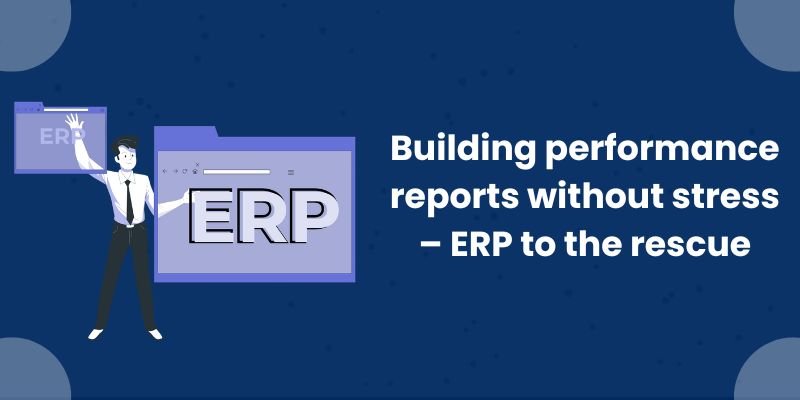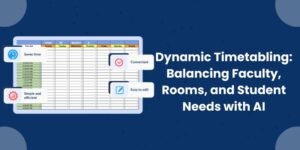In the fast-paced world of school and college administration, performance reports are the bedrock of institutional decision-making. Whether it’s an academic performance analysis, attendance trends, fee collection summaries, or operational audits—these reports help institutions reflect, improve, and plan ahead.
But for many school leaders, building performance reports is often a stressful and time-consuming affair.
Data scattered across spreadsheets. Conflicting figures. Multiple rounds of manual cross-checking. Pressure from stakeholders. Missed deadlines.
It doesn’t have to be this way.
With an Education ERP (Enterprise Resource Planning) system in place, reporting becomes less about panic and more about precision. ERP tools are designed to centralise, automate, and simplify performance reporting across all departments—academics, finance, operations, and more.
Let’s explore how an ERP transforms the stressful process of report-building into a seamless, data-driven routine.
What Makes Performance Reporting Stressful?
Educational institutions generate vast amounts of data every day. But accessing that data in a clean, timely, and meaningful way isn’t always easy.
Here’s what often goes wrong:
- Data silos: Academic records, attendance logs, fee collections, and staff information sit in separate files or systems, making consolidation difficult.
- Manual errors: When reports are built in Excel or on paper, typos, duplications, and miscalculations are common.
- Version confusion: Multiple people editing the same spreadsheet? Chaos. One wrong formula or overwritten cell can distort the entire report.
- Time crunches: Report-building often starts late due to lack of real-time data access, leading to rushed last-minute fixes.
- Limited visibility: Stakeholders need different insights—but a one-size-fits-all report often fails to serve everyone’s purpose.
An ERP system solves these problems at their root.
What is an ERP System for Education?
An ERP system is a unified software platform that connects various functions within a school or college—student information, staff data, finance, operations, communication, and more.
Think of it as the digital nervous system of an institution. Everything—attendance, assessments, library usage, fees, bus tracking—is logged and connected. And because it’s all centralised, generating reports from this data becomes fast and error-free.
How ERP Makes Report Building Easy
1. Centralised Data, One Source of Truth
An ERP eliminates data silos by integrating all departments into one platform. Whether you’re analysing student grades, teacher attendance, or hostel occupancy, all the data lives in a single, secure database.
No need to chase people for updates or compile data from 10 different Excel sheets.
What you get: Less confusion, more clarity.
2. Automated Report Generation
Most ERP platforms come with built-in templates for:
- Student performance reports
- Attendance summaries
- Fee collection dashboards
- Financial audits
- Custom operational reports
With a few clicks, you can generate charts, tables, and even year-over-year comparisons. Advanced ERPs allow auto-scheduling, so you receive updated reports in your inbox every week or month—no need to set reminders or start from scratch.
What you get: Save time, eliminate manual labour.
3. Custom Reports for Different Stakeholders
Teachers, heads of departments, principals, trustees—each group needs different information. ERP systems allow role-based access and customisable dashboards so that:
- Teachers get class-wise performance
- Principals see school-wide academic and attendance trends
- Trustees receive financial summaries and audit reports
What you get: Personalised insights, improved decision-making.
4. Error Reduction with Real-Time Data Sync
The moment attendance is marked, fees are paid, or grades are uploaded, the ERP system updates in real time. This means your reports reflect the most accurate, up-to-date data—not outdated numbers from last month.
What you get: Say goodbye to last-minute corrections and rework.
5. Interactive Visualisations
Modern ERP dashboards turn raw numbers into:
- Pie charts
- Bar graphs
- Heat maps
- Trend lines
These visuals make complex data easier to understand and present to boards or stakeholders. You can even export them for meetings, newsletters, or policy briefs.
What you get: Clear data, better storytelling.
6. Data Security and Audit Trails
Every change made within an ERP is tracked. This means:
- You know who updated what, when.
- Data is backed up and encrypted.
- Reports are compliant with internal and regulatory requirements.
This transparency helps reduce accountability stress during audits or inspections.
What you get: Trustworthy data, stronger governance.
7. Faster Accreditation & Compliance Reporting
Accreditation bodies and education boards often require detailed institutional data. Instead of scrambling at the last minute, ERP allows institutions to:
- Store documentation systematically
- Retrieve historical data instantly
- Respond to data requests within hours, not weeks
What you get: Reduced burden during reviews and inspections.
Imagine You’re a Principal Preparing for a Quarterly Review
Let’s say the principal of a K–12 school needs to present a quarterly performance review to the school management committee.
Without ERP:
- They request attendance data from admin
- Ask each teacher to submit marks spreadsheets
- Wait on the finance office for fee status
- Spend days manually compiling and validating data
With ERP:
- They log in to the dashboard
- Filter data for the relevant quarter
- Export ready-to-use graphs and metrics
- Add insights and send the report within hours
The difference? Peace of mind and a data-backed presentation.
Choosing the Right ERP for Reporting
If performance reporting is your key pain point, here are features to look for in an ERP:
- Real-time dashboard and analytics
- Automated and customisable reports
- Scheduled report generation
- User access management
- Data export in multiple formats (PDF, Excel, CSV)
- Compliance-ready templates
- Mobile-accessible insights for leadership on the go
From Stress to Strategy
At its core, performance reporting is about understanding how your institution is doing—academically, operationally, and financially.
But it should not be a source of stress.
With an education ERP system in place, building reports becomes:
- Quick instead of cumbersome
- Accurate instead of error-prone
- Strategic instead of reactive
The result? Better decisions, stronger accountability, and a leadership team that has the data confidence it needs to drive real change.
So the next time someone asks, “Can you send the latest performance report?”—you’ll already have it ready.
ERP to the rescue.












